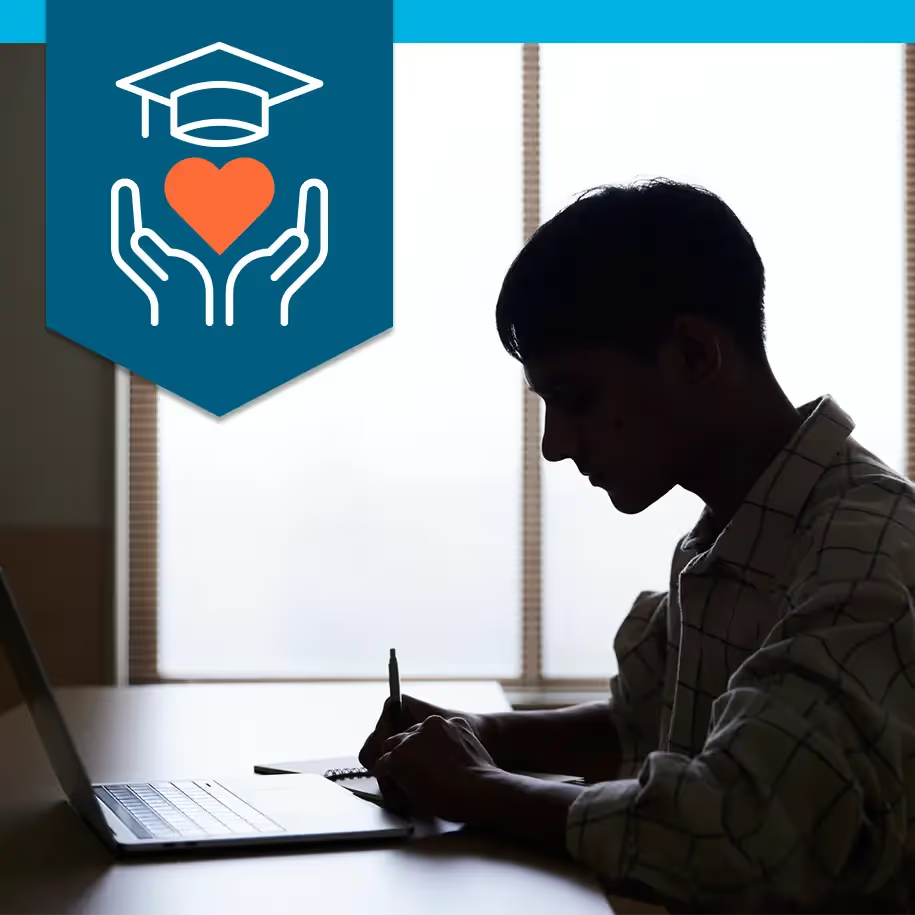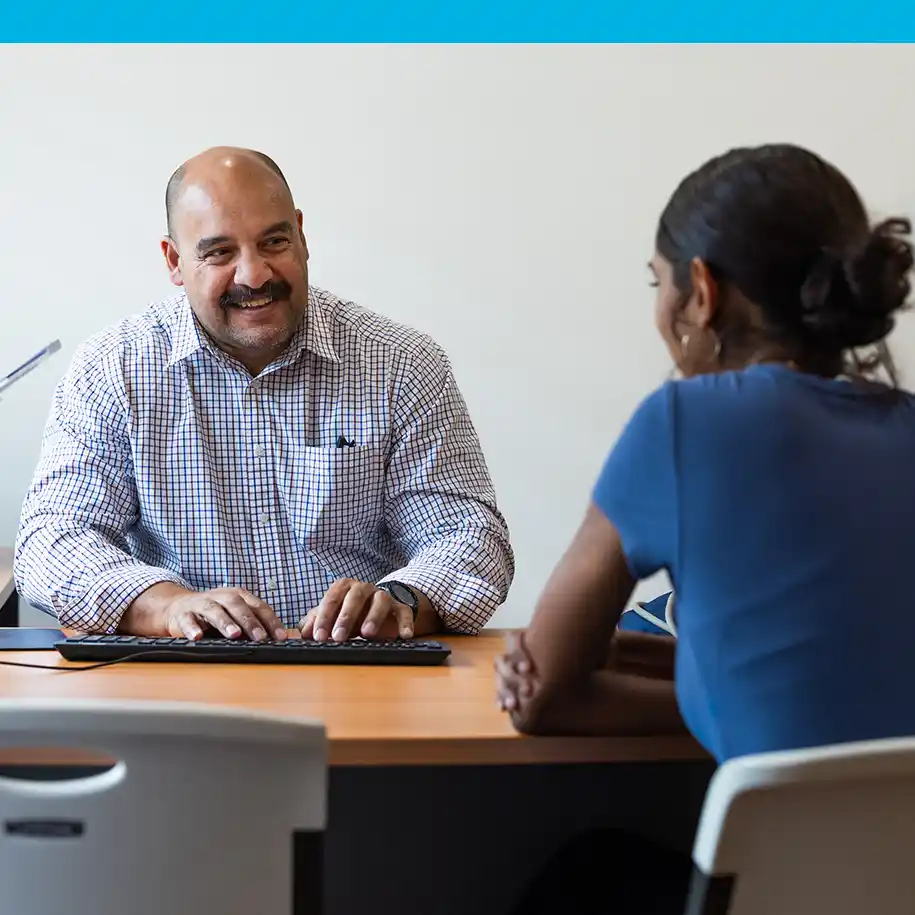.webp)
Impressive results show how The University of Utah is leveraging holistic coaching to help students succeed
Supporting Pell-eligible and first-gen students to persist and thrive
InsideTrack has partnered with The University of Utah for several years, providing direct student coaching as well as coaching training and development. This partnership, along with many other initiatives at the school, is helping fuel a boost in student retention for underserved students — including an 18% retention gain for Pell-eligible students and a 7% retention gain for first-generation students. Read on to learn more about this impactful partnership.
Reflecting a nationwide trend, a University of Utah policy brief from June 2022 shows that economically disadvantaged students in Utah complete their college degrees at much lower rates than their peers, with a gap of approximately 17 percentage points within eight years of high school graduation. What’s more, over 25% of all Utah students across the state identify as first-generation college students.
The challenges faced by economically disadvantaged and first-generation college students are multifaceted. These students often juggle jobs and family responsibilities on top of academic demands while navigating a new and unfamiliar environment. They also may lack the social and cultural capital of their peers, which can hinder their academic success. In order to thrive in college, students need support that goes beyond academics — they need to know that they belong, that they can overcome any financial barriers, that they can connect with resources, and that they aren’t alone.
Looking for ways to better support all its students — especially those from low-income and first-generation backgrounds — The University of Utah (known informally as “The U”) partnered with InsideTrack to embed holistic coaching into their student support practices. The first phase of this multi-year initiative was providing one-on-one success coaching for up to 500 first-year, high-financial-need college students — followed by in-depth coaching development and training that empowered The U’s staff to become certified success coaches.
According to Dr. Thomas Chase Hagood, vice provost for student success at The University of Utah, “This is about scaling the personalized, direct support of success coaching to help students achieve their goals in the critical first year of college.” Dr. Hagood added, “As part of our student success strategy set we call Navigate U, we believe student success coaching is a critical feature in ensuring every student can have an exceptional educational experience.”
Leading with InsideTrack’s coaching methodology, University of Utah student success coaches have demonstrated the power of coaching with significant retention gains after the first year:
- 18% retention increase for Pell-eligible students
- 7% retention increase for first-generation students
And that was just the beginning.
The “why” behind the shift in support
Initially, The U was looking to improve retention for first-year students with high financial needs, with the ultimate goal of transforming their student support services to better address student challenges from every angle. As a large R1 doctoral university with high research activity, The U already had a number of services in place for first-year students, but they were decentralized, and there were gaps in effectiveness. What was needed was a way to connect students with the right resources in the most effective way possible.
As the head of student success and transformative experiences at The U, Dr. P. Brandon Johnson remembers being on a Zoom call with InsideTrack. “We had 11 or 12 student success advocates that were supporting students, but we needed a deeper and richer outcome,” he explained. “We needed to find a different way to serve our student population as it continues to change and evolve.” That’s where InsideTrack came in.
“We wanted to transition this existing program into a coaching program — something grounded in evidence-based research. We also wanted something that had the ability to be replicated, allowing us to build an infrastructure for success that would give students a point of contact at The U who’s there for them in all aspects.” Success coaching ticked all the boxes.
Starting small for big impact
Through its partnership with InsideTrack, The U began building its in-house coaching team during the summer and early fall of 2022, with its first Foundational Coach Training in 2022. Dr. Johnson emphasized the importance of capacity building, noting that bringing coaching in-house fosters trust with their students and demonstrates the school’s commitment to evidence-based practices.
Dr. Johnson believes that the most significant benefit of capacity building is the creation of a coaching-centered campus culture. He noted that staff members from student-facing programs across the institution are invited to participate in Foundational Coach Training. The goal is to educate others about what coaching is in order to equip them with coaching skills to establish a “triage-style” approach and also make the referral process more authentic. As a result, a staff member with a student in front of them won’t have to pass them from office-to-office-to-office. Instead, Dr. Johnson explained “that a staff member will have the tools to be able to address the student’s immediate needs.”
But that’s just part of the story. Dr. Johnson described how The U has also rebranded its program as part of this initiative. The previous program was in existence for almost a decade when the school made the move from advocates to coaches. The goal? To standardize staff training in order to provide a consistency of care and a better student support experience. While every session with a coach is unique, the way they coach is rooted in the same research-proven principles.
Coaching program provides tangible impact
Dr. Stephanie Santarosa, director of student success coaching at the University of Utah, has seen the effectiveness of using InsideTrack’s coaching methodology in their work with students first hand.
“We’ve been able to distinguish our role from that of an academic advisor, therapist, career coach and crisis support advocate and focus fully on the work of holistically supporting students in accomplishing their goals for their education,” she says. “We still collaborate closely with campus partners in these roles to connect students to the best support and resources for their situation, but we don’t take on roles that others are better equipped to fill — instead referring to the professionals in these roles, which is better for everyone! We’ve also focused on student agency. We want to ‘teach them to fish,’ rather than giving them a fish, so they can ‘eat for a lifetime’ instead of just a day.”
Beyond its academic benefits, the coaching methodology has cultivated a more supportive and student-centered environment for campus staff. As Dr. Santarosa explains, “The methodology provides a structure to our coaching sessions that keeps the student in the ‘driver’s seat.’ The methodology’s focus on relationship building and motivation building have been key. Sometimes coaching helps a student find a place of belonging on campus, knowing someone is in their corner. I think this is really important for first gen students. And the focus on building motivation creates positive energy and nurtures self-efficacy in students that may wonder if they can really do this college thing.”
And as a way of normalizing the concept of coaching for students who have likely never had a success coach, the process is built into their freshman orientation, introducing them to coaching from the very beginning. Doing so, according to Dr. Santarosa, emphasizes that coaching is for every student — “whether they are encountering challenges or barriers or simply have a dream for their future and want support in getting there.”
Since the organization’s coach training began in 2022, Dr. Santarosa has been leading a team of coaches delivering student coaching across campus — helping drive impressive and meaningful results in retention and student success.
Key success factors set the stage for impressive results
From fall 2022 to fall 2023, retention rates for Pell-eligible students increased significantly — from 75% to 93%. During that same time, retention for first-generation students rose from 77% to 84%. Overall retention improved from 94% to 99%, with the greatest improvements coming from students with a GPA below 2.5, students who were still exploring their major, and Pell-eligible students. The beauty of truly holistic student success is that impact doesn’t come from one factor alone — it comes from a variety of success factors all working together. What did this look like at the University of Utah?
Meeting students where they are
Dr. Johnson notes they’ve learned via student feedback that something as seemingly benign as scheduling a meeting in an office can be a barrier that prevents students of color, learners with low income, or first-gen students from engaging with staff and administrators. That’s why success coaches at The U walk around campus wearing backpacks that say “Student Success Coach.” This key aspect of the program helps make coaches more visible on campus. They're able to connect with students at the Union, in the lobby of a residence hall, on a bench outside — wherever the student is comfortable having a meeting. It’s all about knowing your student populations and meeting them where they are.
Dedicating someone students can count on
The University of Utah has an enrollment goal of 40,000 students. So having a point person who’s their go-to for questions, advice or just to talk things out is only going to become more necessary as the university student body continues to grow. And that’s a role best served by student success coaches. According to Dr. Santarosa, “Each student success coach is a liaison to at least one academic college and four or five programs or offices on campus. They proactively build relationships with staff in these colleges and programs to create referral pipelines for students.” In doing so, students quickly learn that their success coach can connect them to resources across the campus, helping demystify the college experience.
Coordinating resources via Navigate Hubs
Connecting all student support resources into one place — Navigate Hubs — is a primary objective. But the goal isn’t to have just one Navigate Hub; it’s to strategically place hubs across campus, bringing the essential services to the students. For example, there is a Navigate Hub in the works that will support students in Colleges of Humanities, Science, Social and Behavioral Science, and the School for Cultural and Social Transformation. There’s also a Navigate Hub for Exploring students. In the future, there could be similar hubs for other colleges and focus areas. By coordinating resources, The U is making it easier for students to gain access to the support they need.
Creating stronger lines of communication between departments
As a way to fuel more cross-departmental collaboration and continuity of care, the coaching team has met with colleagues in student affairs, housing, financial aid, the Dean of Students office and other campus departments to discuss what they do and how they can help. And since many staff members across the institution are trained on InsideTrack’s coaching methodology, they speak the same language — exploring ways to make it easier for students to navigate the maze of higher education and access the services they need.
Keeping the conversation student-centered
At The U, there are no prescribed or pre-determined topics for student-coach meetings. When students sign up, they can include notes about anything they want to talk about. But it’s really just a conversation, knowing that coaches are prepared to cover all types of topics and have the ability to “go with the flow” — open and actively listening to whatever direction the student takes the conversation. Regardless of what challenges are uncovered in the coaching conversation, the coach can support the student in developing a plan to address and overcome these roadblocks.
Where is the partnership headed next?
As the initiative moves into phase two, The U has set several key goals for the program moving forward:
- Assign all 5,500 incoming students to a student success coach, with a target coach to student ratio of 500:1
- Have student success coaches lead presentations during New Student Orientation
- Continue to meet with various campus partners for training toward effective referrals
The goal, according to Dr. Johnson, is to “eliminate the noise” — making it as easy as possible for students to connect across support networks and reduce the space between “referral” and “action.” As an example, instead of a student success coach saying “you should connect with the tutoring center,” the coach can pull up the tutoring center website and guide the student in scheduling an appointment as part of the coaching session.
Ultimately, the vision is to continue to create impact for students at The U. Even after the initial coaching engagements ended, the school is still seeing increases in retention. And while the results can’t be attributed to coaching alone, the difference between students who have received coaching and those who haven’t is significant. “What I’m hoping is that we continue to show measurable impact,” says Dr. Johnson. “That connecting our students with coaches becomes a long-standing practice. As we continue to coach, we can see outcomes based on four- to six-year graduation rates.”
But in the end, he notes, “We’re looking at students and thinking about what their needs are. Coaching provides a place where students can feel heard. While we expect this program to increase retention, we’re not chasing numbers. This is a student-forward, human-driven initiative.”
As we continue to focus our efforts on equitable social mobility, empowering and advancing all learners forward to reach their goals, we are thrilled to see the University of Utah creating ripples that make a positive impact on not only students, but their families, their communities and the future that awaits them.

Thomas Chase Hagood, Ph.D. serves as the Vice Provost for Student Success at the University of Utah
Dr. T. Chase Hagood is a first-generation college graduate who brings a unique perspective to higher education leadership and innovation. His transformative educational journey drives his commitment to enhancing academic experiences and outcomes for all students through 21st-century pedagogies and comprehensive support systems. He views higher education as a key vehicle for social mobility and change.
Dr. Hagood is nationally recognized for his historical scholarship on early America and for leading innovative student success initiatives. As a sought-after speaker and consultant, he covers critical topics like educational innovation, student success, faculty development, and institutional effectiveness.
Dr. Hagood serves as the university’s institutional lead for engagements with the Association of American Colleges & Universities (AAC&U), Powered by Publics campaign of the Association of Public and Land-grant Universities (APLU), Undergraduate Education at Research Universities (UERU), Strada Education Foundation, Qualtrics for Higher Education, and as co-liaison to the University Innovation Alliance (UIA).

Dr. P. Brandon Johnson is the senior associate dean for student success and transformative experiences in the Office of Undergraduate Studies at the University of Utah. In this role, he provides strategic leadership for programs and initiatives designed to enhance student engagement, success, retention, and completion. His responsibilities include overseeing key programs such as Student Success Coaching, the Learning Center, and the Center for First-Generation Success, which encompasses TRIO Student Support Services, Upward Bound programs, and a first-year transition learning community. Dr. Johnson also leads initiatives aimed at improving access and support for Indigenous students and those in the foster care system. He has contributed to the field through publications and numerous presentations at national and regional conferences, focusing on student retention, the first-year experience, academic coaching, and advising. Additionally, he serves as vice president of the International College Learning Center Association, furthering his commitment to student success.

Dr. Stephanie Santarosa currently serves as the Director of Student Success Coaching at the University of Utah. She earned Master’s degrees in College Student Personnel and Guidance & Counseling at Bowling Green State University and a PhD in Education from the University of Akron. Within higher education and student affairs, she has worked in student success, honors education, residence life, student involvement, leadership programs, admissions, service-learning, student conduct, career development and counseling. She enjoys being part of any program or project that supports and motivates people, especially college students, to develop their potential, grow into their strengths, and contribute to their communities.
Looking to take a deeper dive into the latest results from the partnership between the University of Utah and InsideTrack?
Coaching solutions proven to advance all learners
Whether you’re looking to help students persist through completion or to improve career outcomes for job seekers and employees, our holistic coaching solutions can help you achieve meaningful outcomes.



